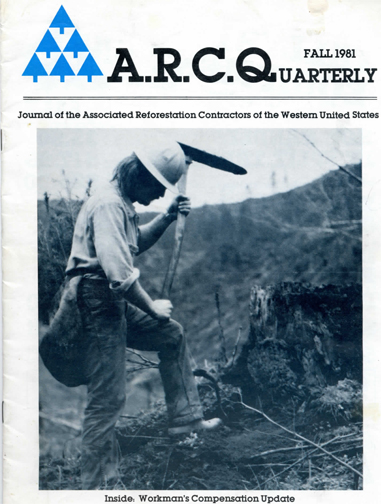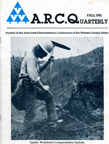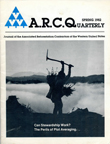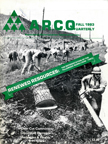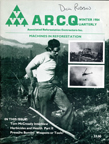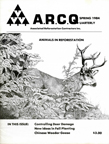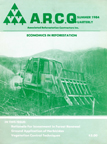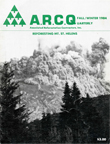Associated Reforestation Contractors, Inc.
A.R.C. Quarterly, 1981 - 1984
Cover of the first (Fall 1981) A.R.C. Quarterly, showing me getting ready to plant a plug-1 tree in the middle of the "12-inch mineral soil scalp" I have made on the downhill side of the burned stump of a fallen snag on Georgia-Pacific property on either the Yaquina or Siletz basin, in Lincoln County, Oregon, in 1981. This was called "micro-site selection" and was applied on a desired tree density/acre basis -- as pioneered by Phoenix Reforestation, Inc., in concert with Merrill-Ring in Washington and Georgia-Pacific in Oregon -- rather than the specific grid patterns typically required on government plantations. Photo by Bruce Fraser, Phoenix Communications, Inc.
Public Letters & Editorials Written by Dr. Bob Zybach
A.R.C. Quarterly Articles: 1981-1985
I wrote the following series of published letters and editorials from 1981 through 1984, mostly while serving as Vice-President of the Associated Reforestation Contractors, Inc. (ARC), and as a semi-regular Editor and Associate Editor of the organization's trade journal, A.R.C. Quarterly; which achieved a national circulation of nearly 1500 copies during its 1982-1985 peak, with the majority of those issues being distributed in the Pacific Northwest (Oregon, Washington, Idaho, British Columbia, northern California) and Washington, DC.
These are among the first articles, editorials, columns, and photographs I ever published and focus on the topics of reforestation, forest management, worker training and safety, forest history, and Wilderness legislation. The photographs in these selections -- mostly by me, Bruce Fraser, and John Foster --- give a nice documentary insight as to the state of Pacific Northwest reforestation practices and conditions at that time; and shortly before the industry became devastated and permanently altered with the severe regional timber depression of the early- and mid-1980s, which continued to spiral downward throughout the 1990s and into much of this century.
The following links connect to more than two dozen columns, column entries, editorials, and photographs that I published in the A.R.C. Quarterly during the years 1981 through 1984.*
Fall 1981 |
"Safety and Profit" (pp. 12-13); photographs (pp. 1, 6, 8, 11a, 11b, 12, 13), A.R.C. Quarterly, Fall: 1, 6, 8, 11-13. [PDF_3_MB] | |
Spring 1982 |
"Workers Compensation Update" (pp. 15, 24); A.R.C. Quarterly, Spring: 15, 24. [PDF_1_MB] | |
Fall 1983 |
"Lead Line" (p. 4); "Facts & Opinions" (pp. 8-9); A.R.C. Quarterly, Spring: 4, 8-9. [PDF_4_MB] | |
Winter 1984 |
"Lead Line," (p. 4); "Letter From The Editor" (p. 7), "Facts and Opinions," (pp. 10-12), photograph (back cover), A.R.C. Quarterly, Winter: 4, 7, 10-12. [PDF_4_MB] | |
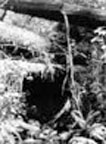 |
Winter 1984 | "Wilderness Controversy" (p. 27), A.R.C. Quarterly, Winter: 27. [PDF_1_MB] |
Spring 1984 |
"Lead Line" (p. 2); "Facts & Opinions" (pp. 8-9); "Brush Control: The Forest Service Takes a Ewe Turn" (p. 17), A.R.C. Quarterly, Spring: 2, 8-9, 17. [PDF_3_MB] | |
Summer 1984 |
"Lead Line" (pp. 2-4);"Facts & Opinions" (pp. 7-9); "Safety & Profit" (pp. 23, 26), A.R.C. Quarterly, Summer: 7-9, 23, 26. [PDF_5_MB] | |
Fall/Winter 1984 |
"You Could Look It Up," (pp. 20-23) Safety Section, A.R.C. Quarterly, Fall/Winter: 20-23. [PDF_2_MB] |
More A.R.C. Quarterly Articles by Dr. Zybach
*Personal Note: These are the contemporary thoughts, opinions, and observations of a founder and owner of a successful Oregon-based family-owned reforestation business; father of two young sons attending Eddyville Grade School; with a 1966 McNary High School, Salem, Oregon diploma and a couple of quarters at Portland State University education. I think it is somewhat remarkable how my interests and perspectives regarding these topics have remained so consistent to the present time, more than 30 years later -- despite significant differences in business fortunes, academic training, physical abilities, and hundreds of additional published articles, editorials, and photographs in the intervening years. Not sure if that is such a good thing necessarily, but it does seem persistent.
